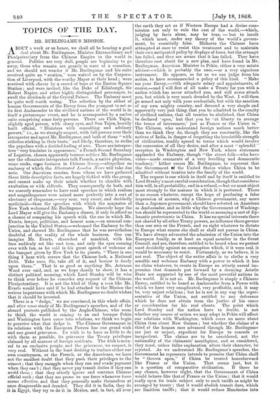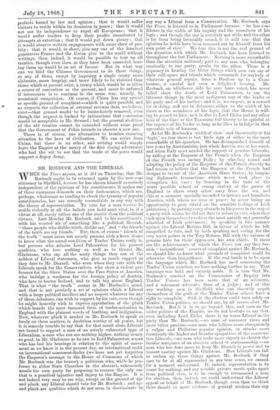TOPICS OF THE DAY.
MR. BURLINGAME'S MISSION.
ABOUT a week or so hence, we shall all be hearing a good deal about Mr. Burlingame, Minister Extraordinary and Plenipotentiary from the Chinese Empire to the world in general. Politics are very dull, people are beginning to go away, those who remain are greatly in want of a sensation, and we should not wonder if Mr. Burlingame and his suite received quite an "ovation," were waited on by the Corpora- tion of Liverpool, with the worthy Mayor at their head ; were received with cheers by a crowd of boys at the Euston Square Station ; and were invited, like the Duke of Edinburgh, Sir Robert Napier, and other highly distinguished personages, to swell the dividends of the Crystal Palace. The Embassy must be quite well worth seeing. The selection by the oldest of human Governments of the Envoy from the youngest to act as its first Ambassador to the civilized nations of the world is in itself a picturesque event, and he is accompanied by a native suite comprising some forty persons. There are Chili Tajen, slightly aged person, with sharp eyes, and Sun Tajen, heavily built official, " Ministers with consulting and advisory powers," i.e., as we strongly suspect, with full powers over their interpreter and agent Mr. Burlingame, and both of them "with stilettos sticking in their boots," and likely, therefore, to strike the populace with a decided feeling of awe. There are interpre- ters "very feminine in appearance," a French Second Secretary of Legation, chosen apparently because neither Mr. Burlingame nor the effeminate interpreters talk French, a native physician, some cooks, sovae footmen in Chinese livery,—altogether an embassy of which the Illustrated London .News will take due note. Our American cousins, from whom we have gathered these little descriptive facts, are hugely tickled with the group, and cannot make up their minds whether to chuckle with exultation or with ridicule. They consequently do both, and we scarcely remember to have read speeches in which realism and magniloquence were mixed more perfectly into a sort of electuary of eloquence,—very sour, very sweet, and decidedly medicinal—than the speeches with which the magnates of New York welcomed Mr. Burlingame. We sincerely hope the Lord Mayor will give the Embassy a dinner, if only to afford us a chance of comparing his speech with the one in which Mr. Evarts, lawyer, politician, and honest man,—an unusual con- junction in the United States,—welcomed the Embassy to the Union, and showed Mr. Burlingame that he was nevertheless doubtful of the reality of the whole business. One can imagine Mr. Evarts, shrewdest of mankind, with his face suddenly set like cast iron, and only the eyes running over with fun, as he said in his great speech of welcome at the banquet given by New York to its guests, "There is one thing I hear with sorrow that the Chinese lack, a National Debt. Take ours, Sir, take all of it, and bestow it freely upon them." That is as good as anything Mr. Artemus Ward ever said, and, as we hope shortly to show, it has a distinct political meaning, which Lord Stanley will be wise to think over before he concedes any request of the Chinese Plenipotentiary. It is not the kind of thing a man like Mr. Evarts would have said if he had attached to the Mission the serious importance with which Mr. Burlingame no doubt wishes that it should be invested.
There is a "dodge," we are convinced, in this whole affair, -and after some study of Mr. Burlingame's speeches, and of the absurd protests published by the Anglo-Chinese, who seem to think the world is coming to an end because Pekin and Washington have come into relations, we think we begin to perceive what that dodge is. The Chinese Government in its relations with the European Powers has one grand wish and one grand grievance. Its wish is to have as little to do with them as possible, its grievance the Treaty privileges claimed by all manner of foreign residents. The wish is natu- ral to an exclusive people, and the grievance, we suspect, is very real. Without in the least desiring to traduce either our . own countrymen, or the French, or the Americans, we have not the smallest doubt that they push their privileges to the utmost ; that they smuggle when they can and evade payment when they can't ; that they never pay transit duties if they can avoid them ; that they utterly ignore and contemn Chinese official rank ; that they are prone to use force whenever force seems effective, and that they generally make themselves at once disagreeable and dreaded. They did it in India, they do it in Egypt, they try to do it in Mexico, and, in fact, all over the earth they act as if Western Europe had a divine com- mission not only to rule the eat of the world,—which, judging by facts alone, may be true, — but to insult it, which must, under any theory of the world's govern- ment, be essentially false. Hitherto the Chinese have attempted at once to resist this treatment and to maintain their own antiquated polity by displays of force, but the attempt has failed, and they are aware that it has failed. They have therefore cast about for a new plan, and have found in Mr. Burlingame, American Minister to Pekin, either a very astute adviser—which is probably the case,—or a very sagacious instrument. He appears, so far as we can judge from his. action, to have recommended a policy of this kind. "Make me your Envoy,—with adequate salary and appointments, of course,—and I will first of all make a Treaty for you with a nation which has never attacked you, and will never attack you, but which is very much dreaded by the West. I will then go armed not only with your credentials, but with the sanction of my own mighty country, and demand a very simple and apparently very just thing, that you be admitted to the comity of civilized nations, that all treaties be abolished, that China be declared open,' but that you be at liberty to arrange the terms of intercourse,' just as France or the Union is." The Chinese, who understand foreign nations much better than we think they do, though they are constantly, like the natives of India, in danger of forgetting the irresistible strength of civilization, readily agreed to terms which would involve the concession of all they desire, and after a most " splendid - reception in Washington and New York, where statesmen applauded the Embassy, though "the street folk—who have votes—made comments of a very levelling and democratic tendency," hither comes Mr. Burlingame, to represent that the Government of the United States wishes China to be admitted without treaties into the family of the world.
The request is one which in itself and by itself is entitled to Lord Stanley's most careful consideration, though that considera- tion will, in all probability, end in a ref usal,—but we must object most strongly to the manner in which it is preferred. There is no reason whatever, except the hope of producing a false impression of menace, why a Chinese government, any more than a Japanese government, should have selected an American as Ambassador, and as little why the Government of Washing- ton should be represented to the world as assuming a sort of dip- lomatic protectorate in China. It has no special interests there not shared by all other Treaty powers, no influence there greater than our own or the French, and no right whatever to dictate to Europe what course she shall or shall not pursue in China. We have always advocated the admission of the Union into the European family, as at least an equal member in the Great Council, and are, therefore, entitled to be heard when we protest most decidedly against an assumption which, if it were real, it would be necessary to resist. Fortunately, as we believe, it is not real. The object of the entire affair is to clothe a very sensible and welcome Embassy with a power to which it has no claim whatever, to create in Europe an utterly unreal im- pression that demands put forward by a decaying Asiatic State are supported by one of the most powerful nations in the world, it is not so. Mr. Burlingame is simply a Chinese Envoy, entitled to be heard as Ambassador from a Power with which we have very complicated, very profitable, and, it may be, very unjust relations ; but he is not in any way the repre- sentative of the Union, not entitled to any deference which he does not obtain from the justice of his cause or consideration for his real clients. The point which Lord Stanley and the nation have to decide, is not whether any course of action we may adopt in Pekin will affect our relations with Washington, which cares no more about China than about New Guinea ; but whether the claims of a third of the human race advanced through Mr. Burlingame are just or unjust, expedient for Europe to concede or inexpedient. The claims are to be considered, not the nationality of the claimants' mouthpiece, and so considered, they must, unless fuller explanation alters their character, be rejected. As we understand Mr. Burlingame's speeches, the Government he represents intends to promise that China shall be " thrown open," if China be treated henceforward
like France or the Union. That seems just, but it is a question of comparative civilization. If there be any chance, however slight, that the Government of China would behave like that of France or the Union ; that it would really open its trade subject only to such tariffs as might be arranged by treaty ; that it would abolish transit dues, which are limitless tariffs ; that it would reduce Mandarins into prefects bound by law and opinion ; that it would suffer visitors to reside within its dominion in peace ; that it would not use its independence to expel all Europeans ; that it would suffer traders to keep their profits unmolested by attempts at extortion ; that it would put down piracy ; that it would observe written engagements with some show of pro- bity; that it would, in short, give any one of the hundred guarantees France and the Union give to the world without writings, then, indeed, it would be possible to tear up all treaties, though even then, as they have been conceded, tear- ing them up would be an act of favour. But in what way can we bind the Chinese Government to do these things, or any of them, except by imposing a single treaty more elaborate, more lengthy, and more likely to be violated than those which at present exist, a treaty which would be as bitter a source of contention as the present, and must be enforced if intercourse is to continue in the same way, namely, by occasional compulsion. Of course, if China has any special or specific ground of complaint—which is quite possible, and as respects the collection of external revenue does, we believe, exist—that ground ought to be immediately removed, even though the request is backed by intimations that concession would be acceptable to Mr. Seward ; but the general abolition of the old treaties cannot be conceded without some proof that the Government of Pekin intends to observe a new one.
There is, of course, one alternative to treaties ensuring attention to the laws of civilization. We can retire from China, but there is no other, and retiring would simply leave the Empire at the mercy of the first daring adventurer who had the wit to see that the trade of the ports would support a Sepoy Army.































 Previous page
Previous page